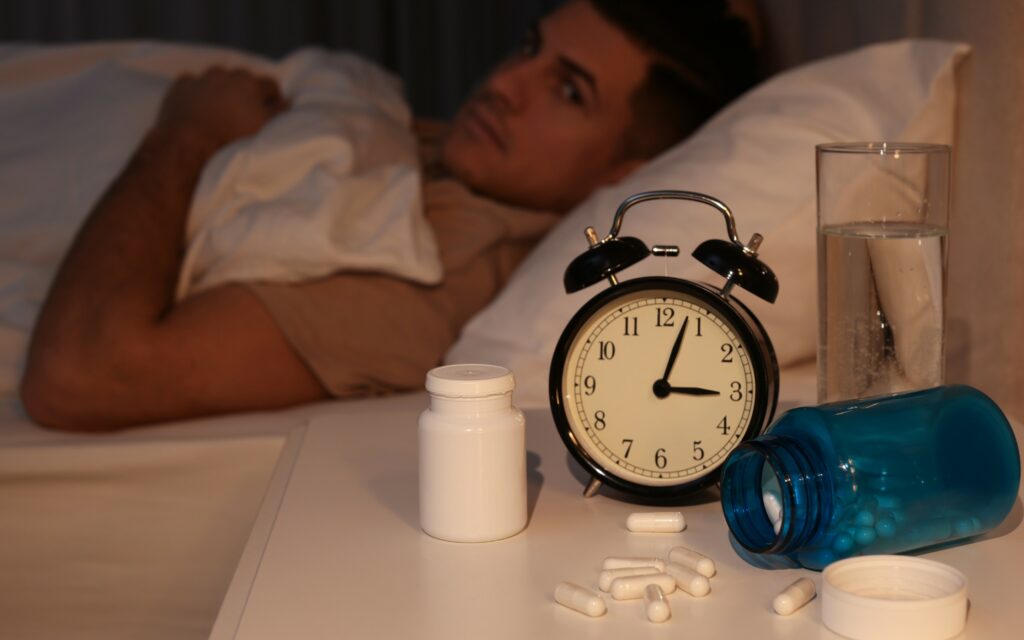Trazodone vs Ambien: which is actually best for your sleep disorder? This might be a difficult question to answer for many insomniacs. After all, both medications are designed to address sleep concerns, but they work in very different ways.
Insomnia is a common condition throughout the world, with around 50-70 million people suffering in the USA alone, according to the American Sleep Association. Since sleep is crucial to our survival, medical professionals have created a host of treatment options to address the problem.
Both Ambien and Trazodone are FDA-approved medications used to help people sleep. However, Trazodone was actually created for the treatment of depression. Its sedative effect has prompted many doctors to prescribe it as a sleep aid throughout the years.
Ambien is a sedative-hypnotic, thought to work by slowing brain activity. It works in a different way to Trazodone but can be just as effective.
Let’s explore the differences.
Ambien vs Trazodone: What is Ambien?
Ambien is a sedative-hypnotic medication prescribed specifically for the treatment of insomnia and similar sleep issues.
The medication works similarly to other potent tranquilizers and sedatives, such as benzodiazepines. It increases the availability of the “GABA” neurotransmitter in the spinal cord and brain, which helps to reduce the actions of other neurons in the brain.
Part of what makes Ambien so attractive as a sleep aid is its ability to work at speed. You can rapidly see the results of Ambien soon after taking it, while alternative solutions can take longer to “kick in”.
Ambien also has a short half-life, which means you don’t need to wait too long for the drug to be out of your system. It can even induce sleep at relatively low doses compared to alternatives like Xanax. Unfortunately, as a “z-drug”, Ambien can be more addictive.
Side Effects of Ambien
Both Ambien and Trazodone can have side effects, much like any other medication. However, the major threat of Ambien comes from its habit-forming tendencies. Other potential issues to look out for can include daytime sleepiness, dizziness, light-headedness, and problems with reaction times.
Common side effects of Ambien may include:
- Nausea and diarrhea
- Problems processing new information
- Rebound insomnia when you stop taking the drug
- Withdrawal and physical dependence
- Parasomnias and hallucinations (Rare but possible)

Trazodone vs Ambien: What is Trazodone?
Unlike Ambien, Trazodone wasn’t primarily designed to promote sleep. Instead, it’s an antidepressant medication. Using antidepressants for sleep is relatively commonplace, as many can produce sedative effects. Trazodone works by increasing the availability of serotonin in the central nervous system.
As a Serotonin Antagonist Reuptake Inhibitor, it blocks neurons from re-absorbing serotonin when it’s released into the body. This ensures serotonin is available within the body for longer, to help battle the issues associated with depression.
The chemical composition of Trazodone also gives it mild sedative effects, which makes it an excellent choice for various forms of insomnia. Trazodone does have its limitations, however. Though users don’t experience REM sleep disturbances, which can be an issue with Ambien, Trazodone’s effects can wear off over time, and can cause daytime fatigue.
Side effects of Trazodone
Like Ambien, Trazodone can have some unattractive side effects which make it less appealing to some people attempting to improve their sleeping habits.
Trazodone also has potential side effects like dry mouth which may interfere with sleep, and it’s not the best treatment for depression for most. Other side effects of Trazodone include:
- Dizziness and dry mouth
- Headaches and unsteadiness
- Fatigue, numbness, or tingling in the extremities
- Ringing in the ears
- Muscle pain and tremors
- Anxiety and problems with attention span
- Weight loss and decreased appetite
There’s also a risk for mild physical dependence with Trazodone, however this is less likely than with Ambien, which is a controlled substance.
Which is better, Ambien or Trazodone?
Ambien and Trazodone both have the ability to address sleep issues. However, the answer to “Is trazodone as good as Ambien” can be difficult to answer.
There are some major differences between the two substances. Trazodone is an antidepressant, not intended originally for the treatment of sleep disorders. Ambien is specifically intended for sleep issues, but it’s also a “controlled substance”. This means it’s more likely to be habit-forming and has the potential to cause abuse and dependence.
As a sleep aid, Ambien is effective at helping people to fall asleep faster and stay asleep for longer. It also comes in an “extended release” version which can be helpful for people with long-term sleep conditions, and it’s relatively easy to access.
However, many people taking Ambien find it can produce cognitive issues and next-day drowsiness. Plus, it’s possible to develop a tolerance to Ambien quite quickly. This means more of the drug is necessary to produce the same effects, making dependence more likely.
Trazodone is commonly chosen as a solution for treating sleep issues at lower doses. It can be safer for elderly individuals than other sleep aids and has fewer side effects than some drugs.
However, it’s not ideal at treating depression at low doses, and it can cause problems with sexual functioning. Trazodone isn’t as sedating as Ambien either, so it may not work for everyone.
Is Trazodone a strong sleeping pill compared to Ambien?
Notably, when choosing between Trazodone vs Ambien, you might be wondering which product is most likely to get you to sleep fastest.
If you’re looking for a quick solution to a major issue with insomnia, Trazodone may not be the ideal choice. This product wasn’t intended as a specific sleeping pill, and it doesn’t have as much of a sedating effect as Ambien.
If you’re looking at strength with a focus on determining which pill is most likely to cause a potential dependence, then Ambien is the bigger risk.
While both of these substances have been associated with physical symptoms of withdrawal in the past, the issues with Ambien are a lot more severe.
People who need to cut down on Ambien might experience flu-like symptoms, stiffness, insomnia, anxiety, and muscle cramps. If you have to cut down on Trazodone or reduce your dosage, you may experience some anxiety, depression, and irritability.
If you’ve been taking any medication for a sleeping disorder for more than a couple of days, your doctor will likely recommend tapering your usage of the substance slowly, to help reduce the risk of withdrawal symptoms.

Is Trazodone as good as Ambien?
There’s no one-size-fits-all strategy when it comes to choosing the best sleeping medication for your needs. It’s also worth noting there aren’t many research pieces or studies on the market which look specifically at the comparative effects of two different products.
One study did look at Trazodone vs Ambien for treating insomnia and found both drugs were tolerated reasonably well by the users. Neither treatment caused significant side effects, however Ambien was considered to deliver better sleeping results during the second week of treatment.
The American Academy of Sleep Medicine generally doesn’t recommend using Trazodone for a sleep medication when other options are available. However, clinicians are advised to offer Ambien as a temporary solution for sleep maintenance and insomnia.
Because everyone is different, and your response to insomnia medication will likely vary depending on your background, it’s important to seek guidance from a medical professional. Your doctor will be able to discuss your options with you while considering your background.
You may be advised to use Ambien or Trazodone, but your doctor could also suggest an entirely different medication, particularly if you’re taking a substance already which may negatively interact with one of these pills.
Can you take Trazodone and Ambien together?
If you’re having a significant issue with your sleep, you may be tempted to use multiple medications at once to address the problem. However, it is not a good idea to take Trazodone and Ambien at the same time. These substances can both cause sedating effects which can be dangerous.
Using the two products together can cause significant impairments in judgement and motor coordination, as well as drowsiness and confusion.
Using too many sleeping products at once can also cause a greater risk of dependence, and heighten your chances of severe side effects like hallucinations and delusional thinking.
Trazodone vs Ambien: Which is right for you?
As mentioned above, finding the right treatment for insomnia is complex. The decision whether to use Trazodone vs Ambien is one best made with the assistance of your doctor. It’s also worth noting no medication is intended for the long-term treatment of sleep issues.
While medications can be ideal for short-term problems, it’s often recommended people consider alternative treatment options for more consistent problems. Cognitive Behavioral Therapy and changes to your sleep routine might be more effective long-term.
Now read these:
—Combining Trazodone and melatonin
—Doxepin vs Trazodone for insomnia
—Mirtazapine vs Trazodone for sleep
Medical disclaimer
You must not rely on the information provided on our website as an alternative to medical advice from your doctor or other healthcare professionals. For more information read our full disclaimer here.







